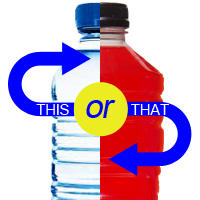This is my second entry having to do with water, “viable to the mechanics of the human”. If you happened to have missed my first entry about how healthy water really is, you can read it here. Afterwards, one of the studies without suffice evidence to declare water the vital source of hydration/rehydration got me thinking, once again. If this isn’t even true for water, then how can sports drink companies claim that they’re the more effective hydration fluid to improve exercising performance ? In these health terms, how does water actually compare to sports drinks?
Clear evidence is available that drinking during exercise can improve performance, that’s a known first explanation. But even when that’s taken into account, Mr. Shirreffs, at the School of Sport, Exercise, and Health Sciences at Loughborough University, still claimed that “sports drinks and water mean different things to different people”. A sports drink can “contain a variety of nutrients and other substances”, unlike water. However, I noticed that “consuming a sports drink will provide a large amount of water in addition to other components which would otherwise be obtained from food”. Looking closer, it isn’t about which fluid does a better job of hydration, but rather which of their nutrients significantly improve performance. Another research written in the Nutrition and Enhanced Sports Performance book, demonstrates under “intense sweating, electrolyte loss, and glycogen depletion, ingestion of solutions containing a proper combination of electrolytes and carbohydrate (sports drinks) may be advantageous compared to plain water”. So as water doesn’t consistent of these nutrients, a product plus multiple vitamins, electrolytes, and carbohydrates could be the superior to water alone? This too should be noted.
Since hydration is a tricky variable to measure, “recovery and subsequent performance studied could be the key to the ultimate comparison between water and sports drinks”. The first study conducted by four authors from the Department of Healthy and Performance Sciences at Georgia Institute of Technology obtained the pre- and post-execerise blood glucose was significantly higher and improved performance with the carbohydrate-electrolyte sports drink. Versus Sports Medicine Australia’s three authors, who described the “relative rate ingested fluids absorbed by the body lacked the least bit of difference in performance comparing the water to sports drinks”. In realizing both produced decently accurate and similar tests, their results varied drastically.
I considered the not entirely randomized controlled trials and confounding/3rd variables to have both effected the rate of ingested fluids absorbed by the body in each study differently. However, since all of these can be manipulated by the ingestion of fluids, it’s difficult to distinguish the correlation in causation to these studies. Rather a correlation between both fluids instead? Because the ideal amount of fluid may depend on individual circumstances. There could be no clear reason as to whether water compares to sports drinks at all. If water doesn’t aid during exercise, and compelling evidence that sports drinks increase the amount of fuel available, it will tend to decorate the rate at which water can be made available? How could that ever be a bonus?
Gathering together all of these explanations, water and sports drinks do not compare in the slightest. Better yet, they could go perfectly hand-in-hand. The composition of a drink should “be influenced by the relative need to supply both fuel and water, which in turn depends on the intensity/duration of exercise, environment, or the individual athlete themselves”. Hydrating fluids has a valuable role to play in the diet of many athletes, so a good “compromised formulation” to fit any needs in any different situation should always stay in retrospect.


